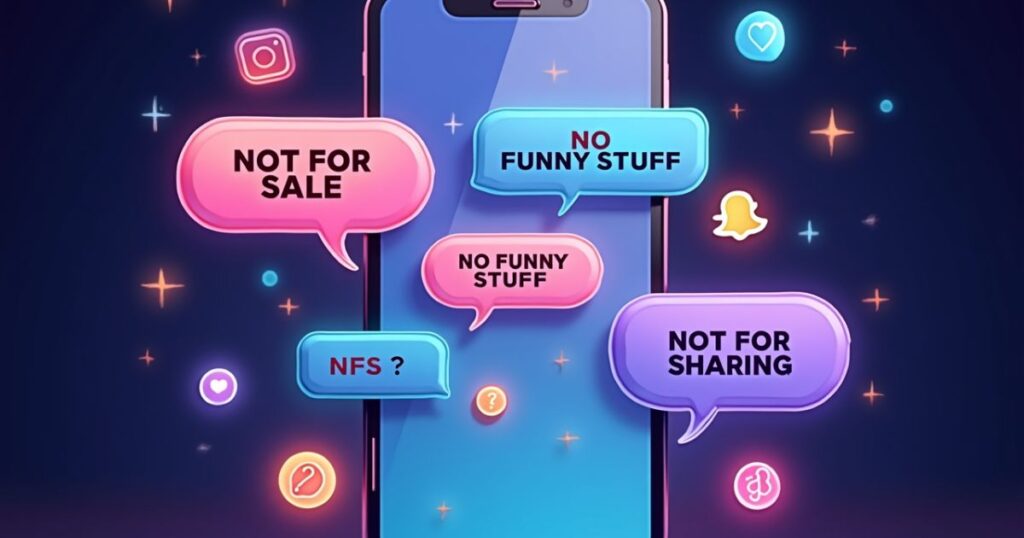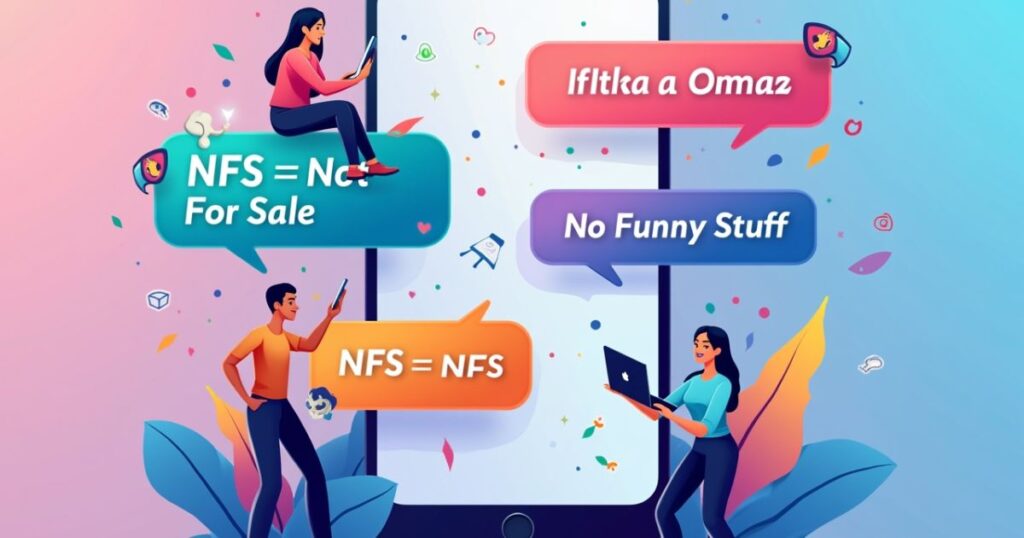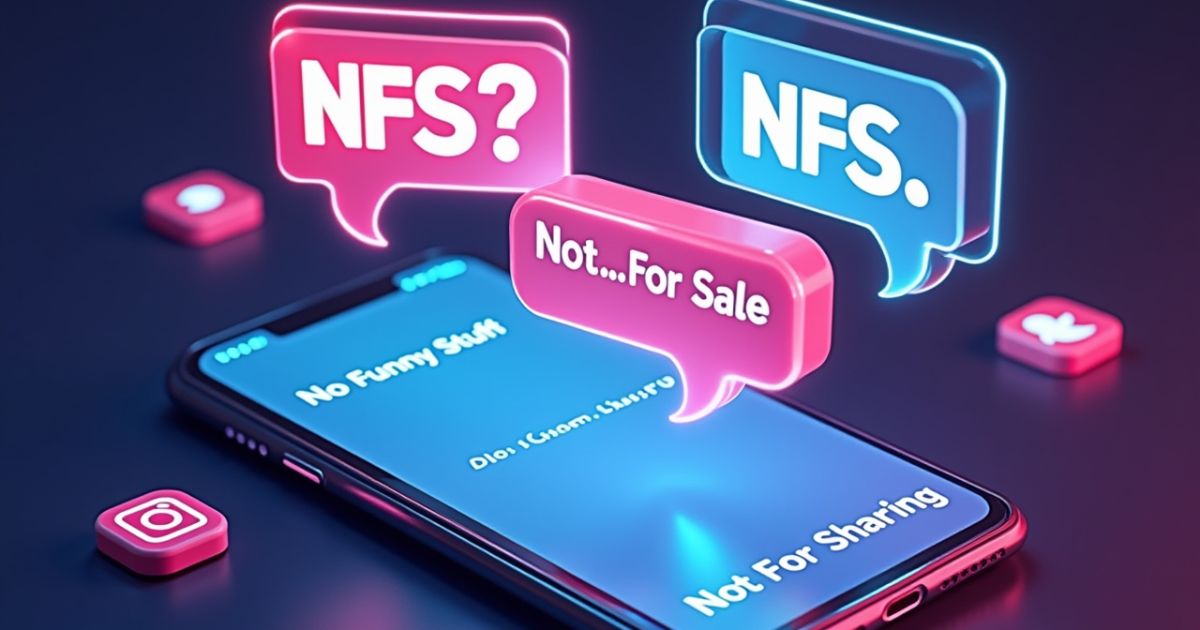NFS appears in 6 billion text messages sent daily in the US, but its meaning changes based on context.
Whether you see NFS on Snapchat, Instagram, TikTok, or Wizz, understanding this popular acronym helps you communicate better. This complete guide explains every NFS meaning with real examples from different platforms and situations.
What Does NFS Mean in Text? Understanding the Most Common Definitions
NFS stands for multiple phrases in digital communication, making it one of the most versatile texting abbreviations online. The meaning depends entirely on the conversation context and platform where it appears.
The most frequent interpretations include “Not For Sure,” “Not For Sale,” “Need for Speed,” “No Filter Sunday,” and “No Filter Selfie.” Each variation serves different purposes in casual conversations, social media posts, gaming communities, and business communications.
In text messaging, NFS most commonly stands for:
- Not for Sale
- No Funny Stuff
- Need for Speed (gaming)
- No Filter Sunday or No Filter Selfie (Instagram trend)
- Not for Sharing
The key is context. The way your friend, a girl, or a guy uses it in conversation will change the meaning.
Understanding which NFS meaning applies requires examining the surrounding conversation, the platform being used, and the relationship between communicators. This context-dependent nature makes NFS both popular and occasionally confusing in modern digital communication.
Different Meanings of NFS in Digital Conversations

NFS as “Not for Sale”
On Instagram, Snapchat, and WhatsApp, you might see someone post an item with “NFS” written in the caption. Here, it means Not for Sale. Example:
- “That car looks cool 😍”
- “Thanks, but it’s NFS.”
People use it in online marketplaces, e-commerce posts, or casual conversations when they want to show something but not sell it.
NFS as “No Funny Stuff”
In texting slang, NFS can also mean No Funny Stuff. This usually comes up in casual conversations when someone wants to set boundaries. For example:
- “Let’s meet later, but NFS okay?”
This is often used in dating chats, DMs, or group texts, signaling seriousness.
NFS in Gaming: “Need for Speed”
If you’re in a gaming community, NFS almost always means Need for Speed, the popular racing game series from Electronic Arts (EA). On Twitter or Discord, you’ll see:
- “Who’s playing **NFS tonight?”
- “Best NFS game is still Most Wanted.”
This version of NFS meaning text from a gamer is tied to racing and competition.
Other Contexts Where NFS Is Used
- NFS Not for Sure meaning → used in casual texting to show uncertainty.
- NFS No Filter Selfie / No Filter Sunday → popular Instagram trends showing authentic, unedited photos.
- NFS Not for Sharing → often used in WhatsApp and Snapchat when sending private photos, videos, or messages.
The Primary Meaning: “Not For Sale” in Digital Communication
“Not For Sale” represents the most common NFS meaning across social media platforms and marketplace communications. Users employ this abbreviation to indicate items, services, or content remain unavailable for purchase.
On Instagram and Facebook Marketplace, sellers frequently use NFS to mark sold items or reserved products. This prevents additional purchase inquiries while maintaining post visibility for reference purposes.
The e-commerce context makes “Not For Sale” particularly relevant for business communications. Online retailers use NFS to indicate discontinued products, exclusive items, or temporarily unavailable merchandise without removing entire product listings.
Alternative NFS Meanings: Context-Dependent Interpretations
“Not For Sure” appears frequently in casual texting when expressing uncertainty or hesitation. This meaning dominates personal conversations where individuals discuss plans, decisions, or opinions with some doubt.
“Need for Speed” connects directly to the popular EA gaming franchise, appearing in gaming communities and racing discussions. Gamers use NFS as shorthand when discussing the video game series or racing topics generally.
“No Filter Sunday” and “No Filter Selfie” represent social media trends encouraging authentic, unedited photo sharing. These meanings appear primarily on Instagram, TikTok, and Snapchat during specific posting contexts.
Additional interpretations include “Not For Sharing” in privacy contexts and “No Funny Stuff” in serious conversations requiring direct communication.
Real-World Examples: How NFS Appears in Different Text Conversations

Uncertainty Context: “Are you coming to the party tonight?” “NFS yet, still waiting to hear from work.”
Marketplace Context: “Is this laptop still available?” “Sorry, it’s NFS now. Someone picked it up yesterday.”
Gaming Context: “Want to play some racing games?” “Sure! I just downloaded the new NFS game.”
Social Media Context: “Love this natural photo of you!” “Thanks! It’s my NFS post for this week.”
These examples demonstrate how context determines meaning, requiring readers to interpret NFS based on conversation topics and participant relationships.
NFS on Social Media Platforms: Instagram, Snapchat, and Beyond
Instagram users employ NFS primarily for “No Filter Sunday” posts and “Not For Sale” marketplace listings. The authenticity movement drives No Filter Sunday trends, encouraging users to share unedited photos showcasing natural beauty.
Snapchat conversations feature NFS meaning “Not For Sure” in casual exchanges between friends. The platform’s temporary messaging nature makes uncertainty expressions common and natural.
TikTok creators use NFS in video descriptions and comments, typically referring to “No Filter Selfie” content or expressing uncertainty about trending topics. The platform’s visual nature makes filter-related meanings particularly relevant.
Wizz app users encounter NFS in both uncertainty and gaming contexts, as the platform attracts younger audiences familiar with multiple NFS interpretations.
WhatsApp and Twitter usage follows similar patterns, with “Not For Sure” dominating personal conversations and “Not For Sale” appearing in business-related communications.
Business and E-commerce Usage: When NFS Indicates Unavailability
Professional contexts primarily use NFS to indicate “Not For Sale” status for products, services, or business assets. This application maintains clear communication about availability while preserving marketing visibility.
Online retailers mark seasonal items, discontinued products, or exclusive merchandise with NFS labels. This approach prevents customer confusion while maintaining product catalog completeness for reference purposes.
Service providers use NFS to indicate temporarily unavailable offerings without completely removing service descriptions. This maintains professional communication standards while managing client expectations effectively.
B2B communications employ NFS in contract discussions, indicating certain terms, products, or services remain non-negotiable or unavailable for specific agreements.
Gaming Communities: NFS as “Need for Speed” References

Gaming communities consistently interpret NFS as “Need for Speed,” referencing the Electronic Arts racing game franchise. This usage appears in forums, streaming platforms, and social media gaming discussions.
Players use NFS when discussing racing games generally, comparing different titles, or sharing gameplay experiences. The gaming context makes this interpretation immediately recognizable to community members.
Esports discussions feature NFS when referencing competitive racing events, tournaments, or professional gaming content related to the Need for Speed series.
Gaming influencers and content creators use NFS in video titles, descriptions, and social media posts to attract audiences interested in racing game content.
How to Determine Which NFS Meaning Applies in Your Conversation
Context clues provide the most reliable method for determining correct NFS interpretation. Examine surrounding conversation topics, platform characteristics, and participant relationships to identify appropriate meanings.
Platform-specific patterns offer additional guidance. Instagram and TikTok favor “No Filter” meanings, while marketplace platforms typically indicate “Not For Sale.” Gaming platforms almost exclusively use “Need for Speed” interpretations.
Conversation tone helps distinguish between casual “Not For Sure” usage and formal “Not For Sale” applications. Personal relationships typically feature uncertainty expressions, while business contexts focus on availability status.
When uncertainty remains, asking for clarification maintains clear communication and prevents misunderstandings that could affect relationships or business transactions.
Common Mistakes: Misinterpreting NFS in Text Messages
Assuming single meanings creates the most frequent NFS interpretation errors. Users often default to familiar interpretations without considering alternative contexts or platform-specific usage patterns.
Business miscommunications occur when casual “Not For Sure” interpretations apply to professional “Not For Sale” contexts. These mistakes can affect sales processes, customer relationships, and business reputation.
Social media misunderstandings happen when users interpret “No Filter” posts as uncertainty expressions or marketplace listings. This confusion can lead to inappropriate responses or missed social connections.
Gaming community mistakes occur when non-gamers encounter “Need for Speed” references without understanding the gaming context, leading to confusion in mixed-audience conversations.
Professional Communication: Using NFS Appropriately in Business Contexts

Professional environments require careful NFS usage to maintain clear communication standards. Business contexts should favor explicit language over ambiguous abbreviations when clarity remains essential.
Email communications benefit from spelling out “Not For Sale” rather than using NFS abbreviations. This approach prevents client confusion and maintains professional presentation standards.
Customer service applications should avoid NFS abbreviations entirely, opting for clear availability statements that enhance customer understanding and reduce inquiry volume.
Internal team communications may use NFS abbreviations when team members understand established meanings, but external communications should prioritize clarity over brevity.
Related Acronyms and Similar Text Abbreviations You Should Know
Understanding related acronyms enhances overall digital communication effectiveness. TBH means “To Be Honest,” IDK represents “I Don’t Know,” and SMH stands for “Shaking My Head.”
LOL indicates “Laugh Out Loud,” while FOMO means “Fear of Missing Out.” YOLO represents “You Only Live Once,” and IMO stands for “In My Opinion.”
To better understand texting acronyms list, here are some close cousins of NFS:
- TBH (To Be Honest)
- IDK (I Don’t Know)
- SMH (Shaking My Head)
- LOL (Laugh Out Loud)
- FOMO (Fear of Missing Out)
- YOLO (You Only Live Once)
- IMO (In My Opinion)
These texting slang terms often appear alongside NFS in various contexts, creating comprehensive abbreviation networks that require contextual interpretation skills.
Learning common acronym patterns helps predict meanings in unfamiliar situations and improves overall digital communication competency across different platforms and relationships.
Best Practices for Clear Communication When Using NFS
Context awareness prevents most NFS-related misunderstandings. Consider your audience, platform, and conversation topic before using any abbreviation that carries multiple meanings.
When doubt exists about interpretation, provide additional context or spell out complete phrases. This approach maintains communication clarity while demonstrating consideration for your audience.
Professional settings require extra caution with ambiguous abbreviations. Business communications should prioritize clarity over character conservation to maintain professional standards and prevent costly misunderstandings.
Monitor responses to gauge understanding levels. If recipients seem confused or respond inappropriately, clarify your intended meaning immediately to prevent communication breakdown.
Conclusion
NFS meaning varies significantly across platforms and contexts, from “Not For Sale” in business to “No Filter Sunday” on social media. Understanding these variations through context clues, platform patterns, and audience awareness ensures effective digital communication.
Whether texting from a girl, guy, or business context, recognizing appropriate NFS usage enhances your online communication skills across all platforms.











